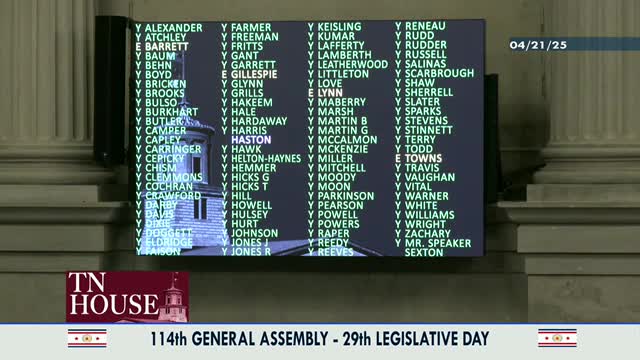House passes portal to check voter eligibility after debate over past mailings and accuracy
Get AI-powered insights, summaries, and transcripts
Subscribe
Summary
Lawmakers approved a bill creating a secretary-of-state portal to verify voter eligibility against criminal and immigration records before registration; proponents said it prevents inadvertent illegal registration, while opponents said it risks discouraging lawful voters and may undercount communities.
The Tennessee House passed House Bill 69 on Thursday, a measure directing the secretary of state to create a portal to verify voter eligibility at registration by checking criminal-conviction records and citizenship status before adding registrants to voter rolls.
House Leader Larry Lambert, who sponsored the measure, said it arose from a local case in Sumner County in which multiple persons with past felony convictions had been registered and prosecuted for voting. “This would go through the secretary of state's office and they would promulgate rules to ensure that if somebody has gotten their rights restored that they can actually provide that information,” Lambert said on the floor.
Representative Pearson and other critics warned the measure risks chilling legal voting. Pearson cited a prior episode when the secretary of state’s office sent tens of thousands of letters to registrants flagged as potentially noncitizens; many recipients reported confusion and some removed themselves from rolls. Pearson and others argued an annual state estimate system or enforcement portal could replicate the outreach problems that suppressed participation in the past.
Lambert and supporters said the portal will be an administrative tool, not a public database, accessible only by the elections coordinator and the secretary of state to avoid exposing private data. "This would be a portal for them to utilize," Lambert said.
Members sought assurances on accuracy and federal data sharing. Representative Clemens asked how the portal would integrate federal immigration or naturalization records; Lambert said the portal’s design would take time and rulemaking into account and counties or the secretary of state could accept documentary proof from an individual who is erroneously flagged.
Supporters argued the tool will reduce the need for some counties to spend money on special censuses and will prevent future prosecutions arising from inadvertent registrations. Opponents said the portal could produce undercounts and burden eligible voters with new administrative steps and urged caution rather than a structural change to how voter rolls are managed.
The House adopted committee amendments and ultimately approved the bill on the floor; the clerk announced the bill received the required majority and declared it passed. The secretary of state's office will develop the portal and promulgate rules for its use, and counties would be able to perform special censuses or provide documentation when they disagree with the portal’s findings.
